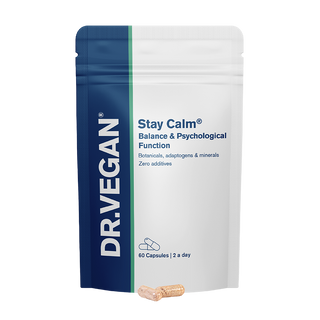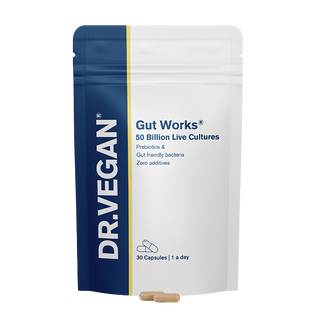Signs of low testosterone

Testosterone, which is dubbed the 'male hormone' (and is also vitally important for women's health) plays a pivotal role in various aspects of men's health. Maintaining healthy testosterone levels is crucial for overall wellbeing, from influencing energy, muscle mass and bone density, to impacting mood, mental performance and libido. Here we explain testosterone, what are considered normal and abnormal levels, symptoms of low testosterone and high testosterone, signs of imbalance, and strategies for maintaining healthy testosterone.
Men's ProMulti was specially created by practitioners for men to address their changing needs with age, supporting healthy testosterone, prostate health, gut health, energy, mental performance, skin and hair, in two convenient daily capsules. With 32 nutrients, including probiotics, prebiotics, botanicals, vitamins and minerals, and zero sweeteners, zero nasty additives that are found in many supplements and green powder shakes, Men's ProMulti is a 'first' in men's health.
Understanding testosterone
Testosterone is a hormone produced primarily in the testicles in men, although the adrenal glands also contribute to its production (in women, testosterone is produced in the adrenal glands and ovaries). Testosterone plays a crucial role in the development of male reproductive tissues, in regulating libido (sex drive), in maintaining bone density, brain function and cognition, muscle mass and overall vitality.
Andropause, often referred to as 'male menopause', is a term used to describe a set of symptoms associated with a decrease in testosterone levels in ageing men. While it's not as well-known as menopause in women, andropause is a natural phenomenon that can significantly impact men's health and wellbeing. Continue reading about andropause.
Normal testosterone levels
Normal testosterone levels in men typically range between 300 and 1,000 nanograms per deciliter (ng/dL). However, optimal levels can vary from person to person, and factors such as age, height, weight and overall health can influence what is considered normal for each person.

Lifestyle choices, including diet and exercise, can also impact the health and wellness of future generations. For example, you may be interested in reading studies into how sperm can impact the risk of diabetes.
High testosterone signs and symptoms
High testosterone levels are less common than low testosterone levels, however they can lead to a number of signs and symptoms. These can include:
- Hair loss or baldness
- Acne
- An enlarged prostate
- Headaches
- High blood pressure
- Mood swings
Identifying and addressing the underlying causes of high testosterone levels is crucial for maintaining overall health.
Causes of high testosterone
High testosterone levels can be caused by a range of factors, including:
- Certain medical conditions
- Genetic predisposition
- Anabolic steroid use
- Hormone replacement therapy
- Testosterone supplementation
Identifying the root cause of high testosterone levels is essential for appropriate management, and if you're at all concerned about your testosterone levels, consult your GP or a healthcare provider who will be able to conduct tests to assess your levels and potential causes. Certain medications can help reduce testosterone levels, and dietary choices can also help regulate and lower testosterone levels. Foods including nuts and seeds, soy, and foods high in trans fats can all help maintain healthy testosterone, and studies show too high consumption of alcohol can also reduce testosterone levels.
Men's ProMulti

Symptoms and signs of low testosterone
Testosterone levels in men peak at around the age of 19 or 20, at which point levels stay generally stable in most men until their mid to late 30s. At around the age of 40, men's testosterone levels begin to fall at 1-2% a year, however about a third of men over the age of 45 have levels of testosterone below what is considered 'normal' for their age.
In addition to the natural decline in testosterone with age, other factors can contribute to reduced testosterone. 'Hypogonadism' is a medical condition where the testicles produce little or no testosterone, which can happen at any age, while abnormalities in the pituitary gland (a pea sized gland at the base of the brain) can also cause reduced testosterone. Poor diet, obesity, injury, certain medicines such as anti-androgens, chemotherapy and chronic steroid use, can also lead to abnormally low testosterone levels.
Low testosterone levels, which are often associated with ageing, can manifest in symptoms including:
- Low sex drive
- Fatigue
- Decreased muscle mass
- Increased body fat
- Loss of body hair
- Mood swings
- Feelings of depression
DR.VEGAN® Bone & Muscle Support is certified by Informed Sport and used by professional athletes to provide daily support for bone and muscle health, with highly bioavailable forms of Calcium, Magnesium, Vitamin D3 and Vitamin K2.
How to maintain healthy testosterone levels
A holistic approach including diet and lifestyle modifications, exercise, and targeted supplements for healthy testosterone, can all help to maintain or even increase testosterone levels naturally.
Men's ProMulti is the uniquely comprehensive supplement for men's health, an all-in-one formula of 32 nutrients including probiotics, prebiotics, botanicals, vitamins and minerals for maintaining healthy testosterone, prostate, gut health, energy, skin, hair and vitality. In addition to supplements, there are a number of important steps to maintaining healthy testosterone:
- Follow a balanced diet rich in nutrients including Zinc, Vitamin D3, and Omega 3 fatty acids.
- Reducing fat, especially belly fat, through diet and exercise can improve the testosterone-to-oestrogen balance in men.
- Resistance exercises and weightlifting are proven in research to increase testosterone levels, both in the short term and over the longer term if followed consistently.
- Avoid stress and anxiety. Studies show chronic stress can lead to a reduction in testosterone. You may also enjoy reading the latest customer survey into the effects of stress and anxiety.
- Ensure you're getting sufficient sleep. Poor sleep or insomnia increase stress and anxiety, and can also lead to poor dietary choices which in turn increase the risk of becoming overweight, and potentially other health conditions including heart disease, insulin resistance and type 2 diabetes.
How to know if you have low testosterone levels
If you suspect low testosterone levels and feel it may be affecting your health, it's essential to consult with your GP or a healthcare provider. A blood test can provide accurate information about your testosterone levels and overall hormonal status. Symptoms such as persistent fatigue, changes in sexual function and mood swings should prompt a visit to a healthcare professional for a comprehensive evaluation.
You may also enjoy reading:
- Does sex boost your immune system?
- The impact of your gut on your heart
- What does your poo say about your health?
- Common and unusual symptoms of IBS
- The alarming reality of men's mental health
- Best diet for prostate health
- Is gut health and erectile dysfunction linked?
See what your diet provides and what it's missing and create your free Diet Profile - it’s free and takes just 3 minutes.
Discover our range of vegan supplements and probiotics.
Want to hear more from our nutritionists? Sign up to our email newsletter for insights and exclusive offers:


















